4 Effective Ways To Use Grape Seed Oil And Its Benefits
Reap the ultimate health perks of this wholesome oil variety by using it the right way.
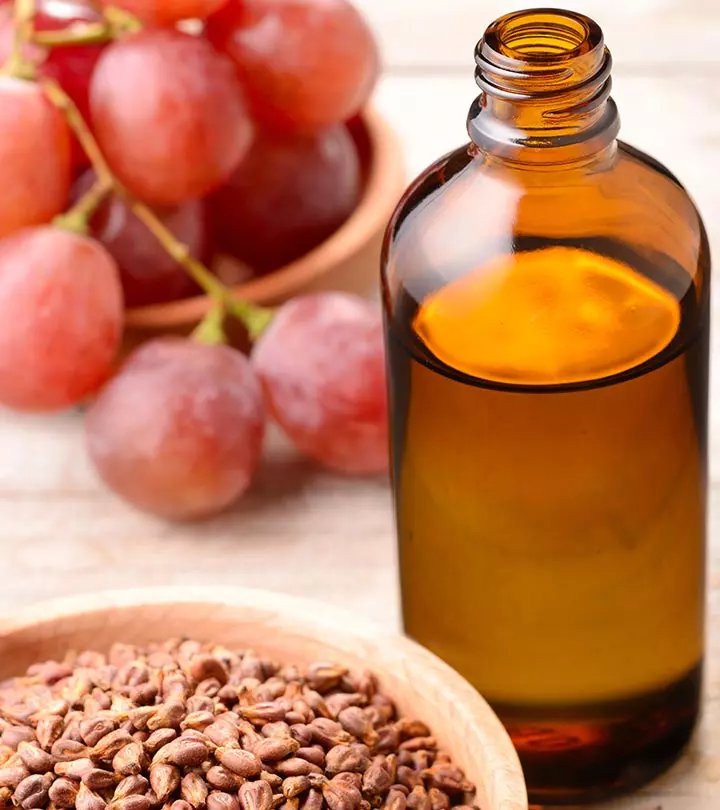
Image: Shutterstock
There is growing interest in oils promoting hair growth and rejuvenating the scalp. Grapeseed oil for hair care is a great choice, as it contains a lot of essential fatty acids. In addition, this oil is loaded with vitamin E and powerful antioxidants.
Moisturizing is one of the key properties of grapeseed oil. The oil contains nutrients that promote healthy hair growth. It is extremely versatile, and you can use it in various ways.
You can use grapeseed oil to strengthen hair roots, hydrate the scalp, and nourish your hair. Here, we have looked at grape seed oil’s benefits for hair, its uses, and how to apply it. Scroll down to read more.
 Know Your Ingredient: Grapeseed Oil
Know Your Ingredient: Grapeseed OilWhat Is It?
A slightly yellow oil with a greenish tinge that is derived from the seeds of grape plants.
What Are Its Benefits?
It helps fight dandruff, soothe the scalp, boost hair growth, and tame frizz.
Who Can Use It?
It is suitable for all hair types.
How Often?
1-2 times a week as a pre-shampoo treatment.
Caution
Pregnant and lactating women should consult their gynecologist before using this oil.
In This Article
Grapeseed Oil Nutrient Profile
Grapeseed oil is a nutrient-rich and versatile ingredient that can serve multiple purposes, ranging from cooking to skin care. Here are some of its major nutrient components and their benefits (1):
- Polyunsaturated Fatty Acids: May lower the risk of chronic diseases like cancer and heart disease (2).
- Monounsaturated Fatty Acids: Improve blood lipid profiles (3).
- Polyphenols: Regulate weight, promote gut health, and help in the improvement of certain chronic diseases (4).
- Phytosterols: May help regulate cholesterol and fight inflammation (5).
- Vitamin E: Offers antioxidant protection against free radical damage and plays a vital role in maintaining your skin and health (6).
Let’s dive deeper into the diverse benefits of grapeseed oil for your health.
Key Takeaways
- Grapeseed oil may strengthen the hair, nourish the roots, and moisturize the scalp to maintain hair health.
- It has anti-inflammatory properties, may minimize dandruff, and fight cellular damage.
- Grapeseed oil is best for relaxing hot oil scalp massages. You may add it to your DIY hair masks and mix it with other hair oils.
Grapeseed Oil Benefits For Hair
For a long time, grapeseed oil was only considered a byproduct of the wine industry. However, the oil is fast gaining prominence as a beauty and hair care product. Here is how the oil can benefit your hair.
1. Fight Dandruff
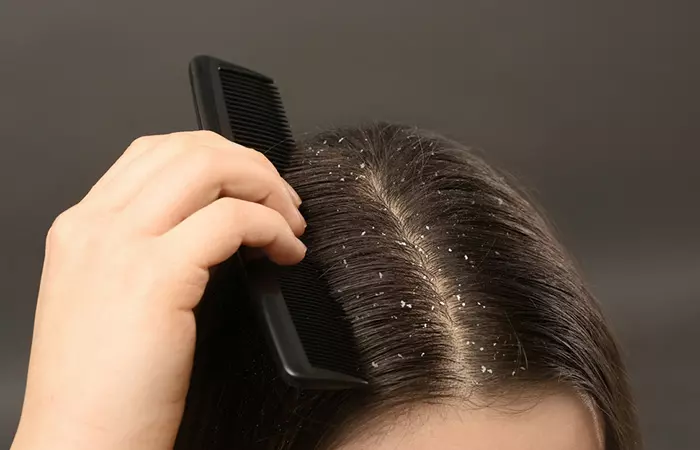
Grapeseed oil is an excellent moisturizer and has anti-inflammatory properties (7). It may help control dandruff caused by a dry flaky scalp. It moisturizes your scalp and hair and works well as a massage oil too. It is light and odorless and could be a better alternative to olive or coconut oils. Massage your scalp with warm grapeseed oil by rubbing it in a gentle, circular motion.
2. Effective As A Deep Conditioner
The nutrient-rich grapeseed oil soothes the scalp and makes your hair soft and silky.
It can be used as a conditioner. Apply a generous amount of the oil to your hair and leave it on for 30 minutes before shampooing.
Tina, a haircare blogger, found grapeseed oil to be a good hair moisturizer. She writes, “Although I have mixed feelings so far about grapeseed oil, my hair seems to like it (i).” She adds, “But when I consistently moisturize my hair, which I do twice a day, I don’t have very much shedding.”
3. Promote Hair Growth
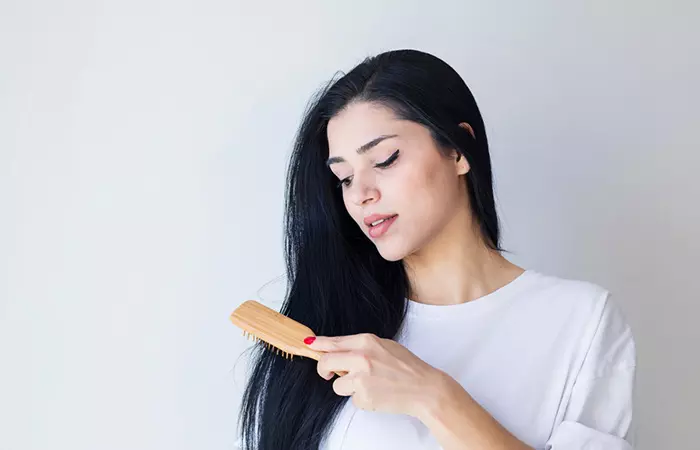
Using grapeseed oil for hair regularly may promote hair growth. In a Japanese study, grapeseed oil was shown to promote hair growth in mice (8). However, there is limited evidence to show the oil’s effectiveness in humans. For best results, you can mix grapeseed oil with jojoba, eucalyptus, or peppermint oils and regularly apply it to your scalp.
4. Strengthen Hair Roots
Massaging your scalp with warm grapeseed oil can help promote blood circulation.
A gentle scalp massage in a circular motion may stimulate hair follicles and boost hair growth. However, more research is warranted in this regard. If you struggle with thinning hair, make oil massages with grapeseed oil an essential part of your hair care regime.
5. Help Tame Frizz
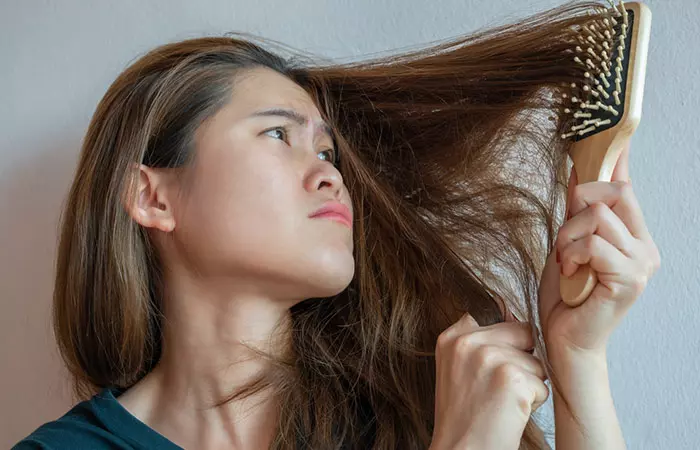
Grapeseed oil is lighter than other popular beauty oils like that of olive or coconut. It can ideally be applied to the hair between showers. It helps seal hair moisture and tames frizzy hair. This natural oil also helps prevent split ends and brittle hair, which in return also helps promote a smoother and naturally lustrous appearance.
6. Suitable For All Hair Types
Grapeseed oil suits all hair types, including curly, wavy, straight, long, or short hair. It is rich enough to nourish and tame thick and curly hair and gentle and light enough for fine and thinning hair.
7. Help Fight Cellular Damage
Grapeseed oil is rich in fatty acids and vitamins (1). It contains carotenoidsi A family of naturally occurring pigments found in the cells of a wide variety of fruits, algae, and vegetables. and linoleic acidi An essential fatty acid that is effective in reducing total and LDL (low-density lipoprotein or bad) cholesterol. that have antioxidant and anti-proliferativei A substance used to retard or prevent the growth of cells, especially malignant (cancerous) cells. properties (7). They may help in hair cell regeneration. They also may repair damaged cells in the scalp.
This plant-based oil is light, odorless, and versatile and can be easily incorporated into your hair care routine. The following section states how to use grapeseed oil as an effective hair treatment.
Four Effective Ways To Use Grapeseed Oil For Hair Care
1. As A Light Moisturizer
If you have dry or brittle hair, you can use grapeseed oil as a light moisturizer to make your hair smooth and supple.
- Take a few drops of the oil between your palms and rub together.
- Gently apply to the length of your hair.
- Comb through to distribute.
2. As A Hot Oil Treatment
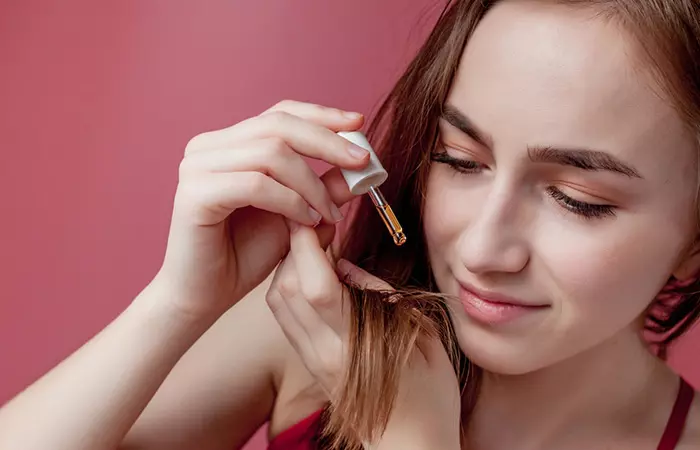
A grapeseed oil massage boosts scalp health and makes your hair smooth and shiny. You can also use grapeseed in a hot oil massage to prevent hair loss.
- Gently heat two to three tablespoons of grapeseed oil and add three to four drops of lavender or rosemary essential oils.
- Apply this warm oil blend to your scalp with your fingertips and massage in circular motions.
- Run a wide-toothed comb through the length of your hair to thoroughly distribute the oil.
- Wrap your head in a warm towel for 30 minutes and wash with a gentle shampoo.
 Quick Tip
Quick Tip3. As A Spray For Frizz Control
You can make a nourishing oil spray for your hair with grapeseed oil if you are looking for a natural remedy to combat frizzy and dry locks.
- Add one cup of filtered/distilled water, one to two tablespoons of grapeseed oil, and a few drops of lavender essential oil to a spray bottle.
- Shake well and spray liberally to your frizzy hair to soften it instantly.
4. As A DIY Hair Mask
A hectic, modern lifestyle can take a toll on your hair health and make your hair look dull and lifeless. Hair masks with nourishing ingredients like grapeseed oil can help restore hair health.
- Mash one over-ripe banana and mix with a tablespoon of grapeseed oil.
- Slather this mixture all over your scalp and hair.
- Leave the mask on for 30 to 40 minutes.
- Rinse the hair mask off with warm water and a mild shampoo.
5. Blend With Other Oils
The lightweight and odorless grapeseed oil makes for an excellent carrier oil. It can be used with essential oils in hair spas and aromatherapyi A type of alternative medicine that uses essential oils which especially impact the emotional center of the brain. treatments. It is also easily absorbed by the scalp and works as an ideal base for hair massage oils.
Here are a few grapeseed oil blends to add to your hair care routine:
- Grapeseed Oil And Almond Oil
Both grapeseed and almond oils are rich in vitamins and are known for their moisturizing qualities (7). A blend with equal parts of grapeseed and almond oil can work as an excellent base for a hair massage oil.
- Grapeseed Oil And Olive Oil
Grapeseed and olive oils are loaded with phenolic compounds and vitamin E (7). These plant oils are also rich in monounsaturated oleic acidi A naturally occurring fatty acid that is found in a wide variety of vegetable and animal fats with antibacterial properties. that allows them to penetrate the hair shaft deeply (7). A blend of these two oils can benefit those with high porosity hair.
- Grapeseed Oil And Tea Tree Oil
Tea tree essential oil is used for its antibacterial, antiviral, antifungal, and anti-inflammatory properties (9). Add eight to ten drops of tea tree essential oil to 50 ml grapeseed oil to make an anti-dandruff oil blend.
- Grapeseed Oil And Lavender Essential Oil
Grapeseed oil helps with deep overnight conditioning while the lavender essential oil is known for its calming properties and a soothing fragrance. Mix eight to ten drops of lavender essential oil with 50 ml of grapeseed oil.
 Did You Know?
Did You Know?While there are many ways to use grapeseed oil for hair growth and better scalp health, you need the right variety to reap the benefits. The following section discusses how you can buy the best grapeseed oil on the market.
How To Buy The Best Grapeseed Oil For Hair
It is important to note that not all varieties of grapeseed oils are equally beneficial. While refined grapeseed oil is cheaper and has a longer shelf-life, harsh processes can remove the vitamin E and other nutrients from the oil.
Hence, ensure to choose pure and natural cold-pressed oil for the best results. Organic, hexane-free grapeseed oil free from parabens, chemicals, and artificial colors is ideal. While there are many grapeseed oil brands on the market, not all are made equal. Do your research before buying. Additionally, try to purchase from reputable suppliers who disclose their extraction methods and ingredient sourcing. This absolute transparency will ensure you receive a high-quality product that preserves its beneficial properties.
Infographic: Facts About Grapeseed Oil
Grape seed oil can greatly benefit your hair health. But what else do you know about this so-called miraculous oil? Did you know that this oil has been in use for centuries, dating all the way back to ancient Greek times?
Check out the infographic below to learn some more fun facts about this healthy and light oil! Illustration: StyleCraze Design Team
Grapeseed oil is packed with vitamin E, essential fatty acids, and powerful antioxidants. It is excellent for promoting hair growth and rejuvenating the scalp. This lightweight, versatile oil nourishes your hair, moisturizes the scalp, and strengthens hair roots. You may use grapeseed oil for hair care issues like frizziness, hair thinning, and split ends. Use it as a light moisturizer, hair mask, spray, or massage oil. You can also use grapeseed oil for your skin by incorporating it into your daily skin care routine and combining it with other essential and carrier oils. Always choose natural cold-pressed and pure oil.
Frequently Asked Questions
Is grapeseed oil or coconut oil better for hair?
Grapeseed oil and coconut oil are equally good for your hair. Coconut oil is a moisturizing oil that penetrates the hair shaft, while grapeseed oil is a sealant that sits on the hair shaft and traps in the moisture. Therefore, both function in different ways and are good hair oils for all hair types.
Can I leave grapeseed oil in my hair overnight?
Yes, leaving grapeseed oil overnight will help deep condition your hair. It helps reduce frizz and manage your hair.
Can I use grapeseed oil on dry hair?
You can apply grapeseed oil to dry hair if you want to use it as a hot oil treatment. However, your hair should be a little damp if you want to use it as a sealant.
Illustration: Effective Ways To Use Grape Seed Oil And Its Benefits
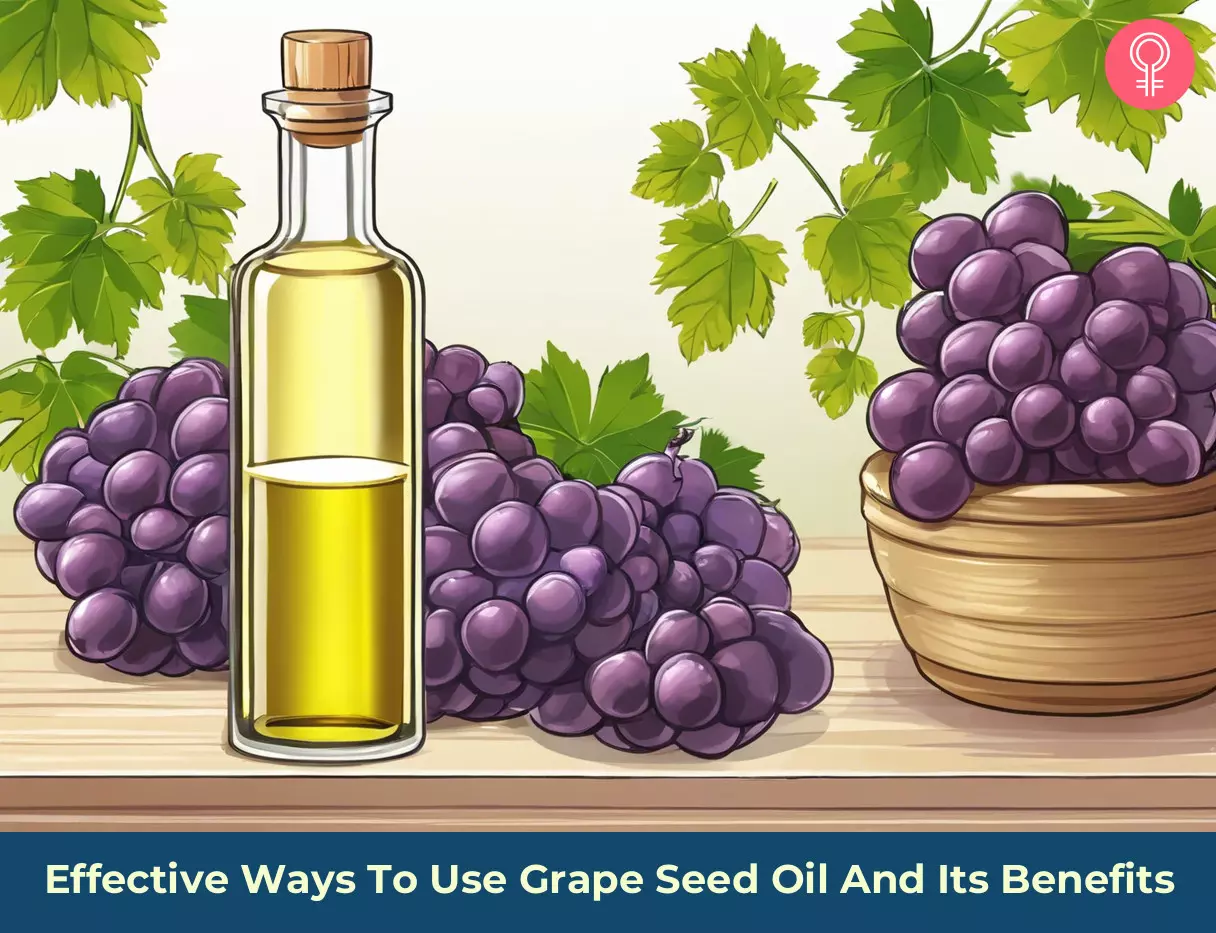
Image: Stable Diffusion/StyleCraze Design Team
Grapeseed oil is a great natural remedy for the hair and skin. Learn about 10 amazing benefits it has to offer in the following video.
Personal Experience: Source
StyleCraze's articles are interwoven with authentic personal narratives that provide depth and resonance to our content. Below are the sources of the personal accounts referenced in this article.
i. My experience with Bentonite Clayhttps://iamnaturallykinky.wordpress.com/tag/grapeseed-oil/
References
Articles on StyleCraze are backed by verified information from peer-reviewed and academic research papers, reputed organizations, research institutions, and medical associations to ensure accuracy and relevance. Read our editorial policy to learn more.
- Grape Seed Oil Compounds: Biological and Chemical Actions for Health.
https://www.ncbi.nlm.nih.gov/pmc/articles/PMC4988453/ - Omega-3 Polyunsaturated Fatty Acids: Benefits and Endpoints in Sport
https://www.ncbi.nlm.nih.gov/pmc/articles/PMC6357022/ - Monounsaturated fats from plant and animal sources in relation to risk of coronary heart disease among US men and women
https://www.ncbi.nlm.nih.gov/pmc/articles/PMC5875103/ - The Role of Polyphenols in Human Health and Food Systems: A Mini-Review
https://www.ncbi.nlm.nih.gov/pmc/articles/PMC6160559/ - The Bioavailability and Biological Activities of Phytosterols as Modulators of Cholesterol Metabolism
https://www.ncbi.nlm.nih.gov/pmc/articles/PMC8781140/ - The Role of Vitamin E in Human Health and Some Diseases
https://www.ncbi.nlm.nih.gov/pmc/articles/PMC3997530/ - Anti-Inflammatory and Skin Barrier Repair Effects of Topical Application of Some Plant Oils.
https://www.ncbi.nlm.nih.gov/pmc/articles/PMC5796020/ - Procyanidin oligomers selectively and intensively promote proliferation of mouse hair epithelial cells in vitro and activate hair follicle growth in vivo.
https://pubmed.ncbi.nlm.nih.gov/10084307/ - Melaleuca alternifolia (Tea Tree) Oil: a Review of Antimicrobial and Other Medicinal Properties.
https://www.ncbi.nlm.nih.gov/pmc/articles/PMC1360273/
Read full bio of Dr. Shruti Chavan
Read full bio of Arshiya Syeda
Read full bio of Ramona Sinha
Read full bio of Medha Deb






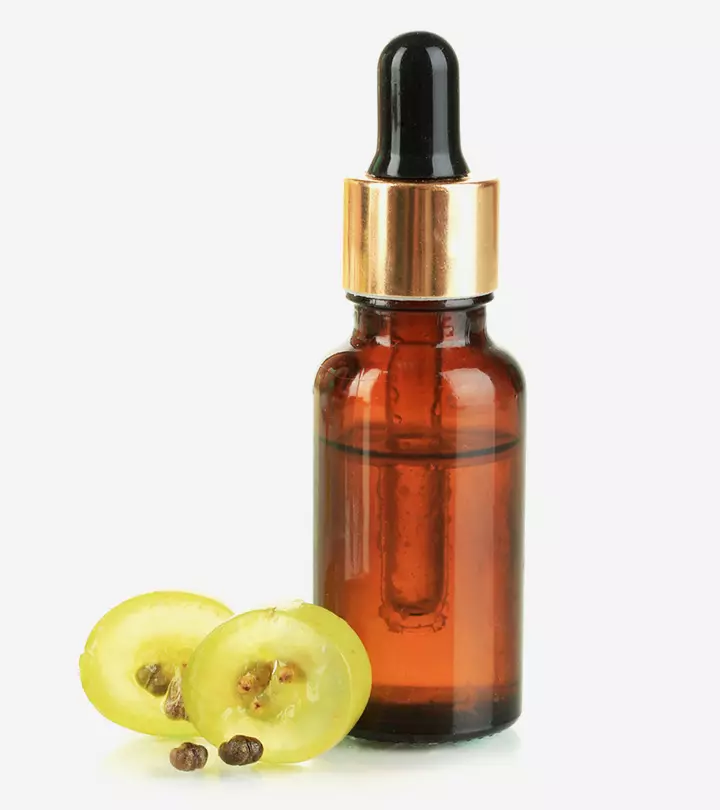
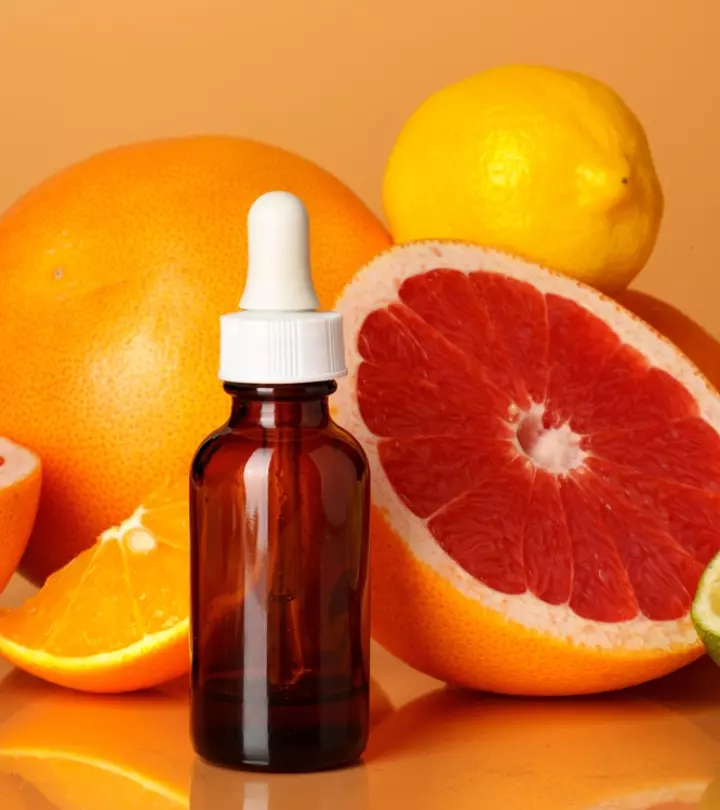
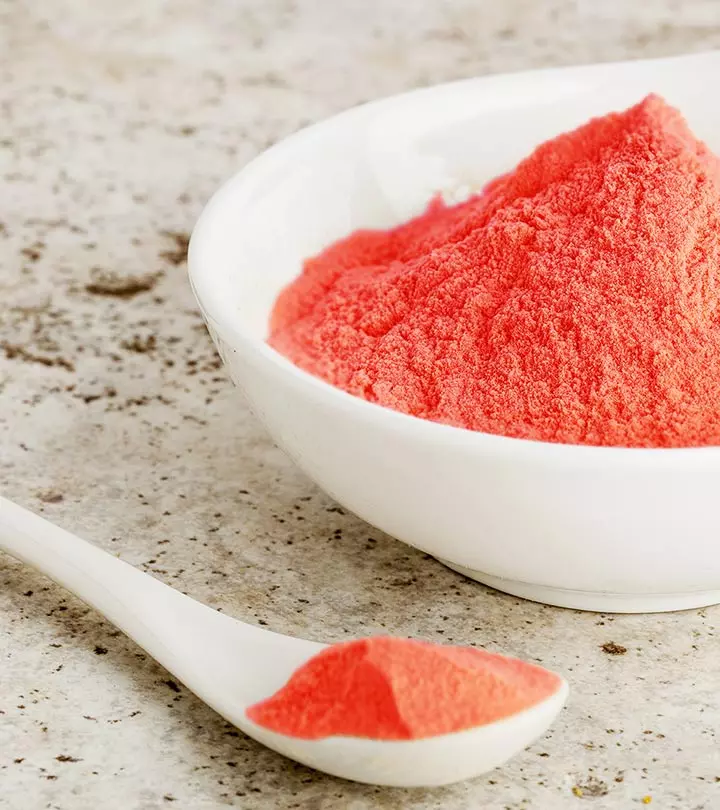


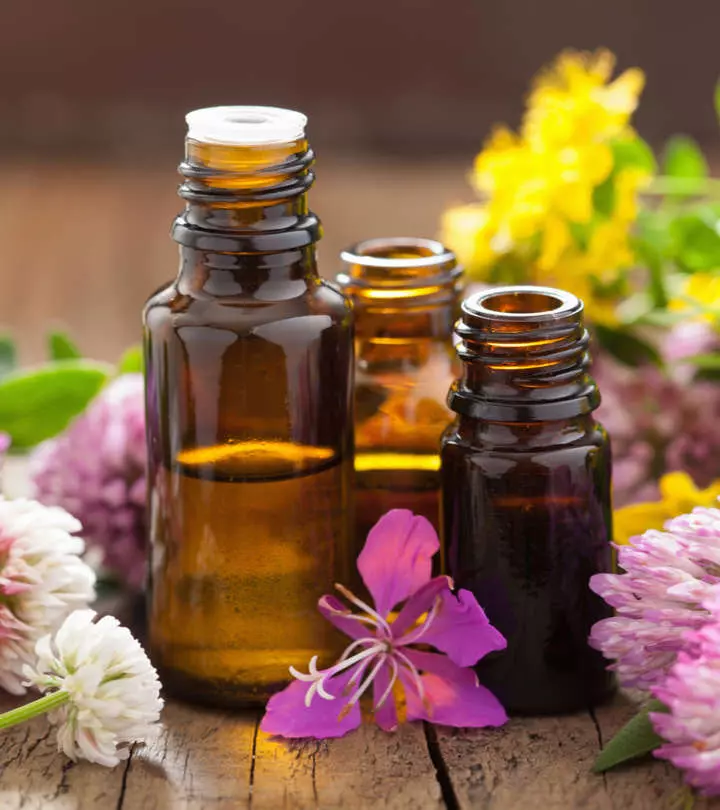
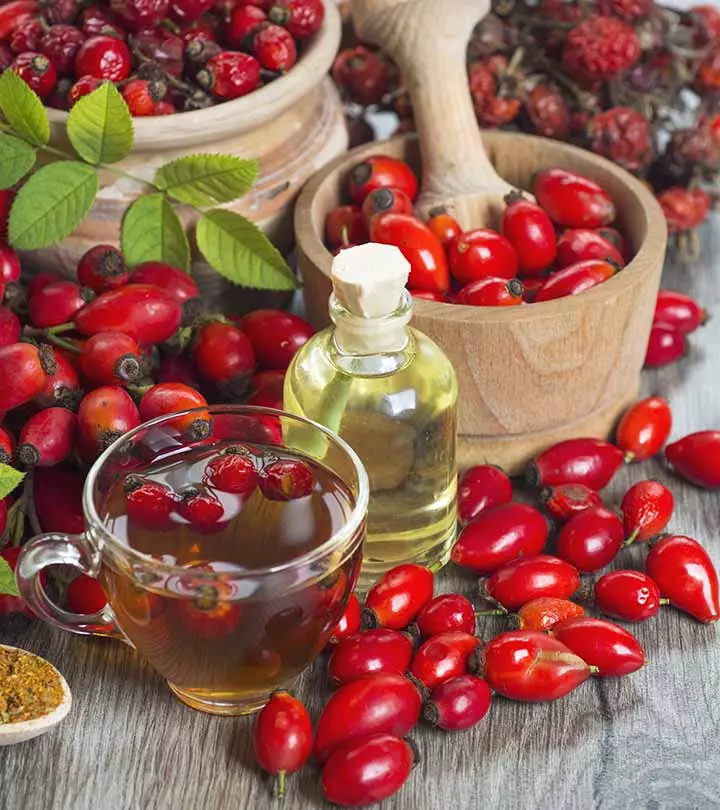
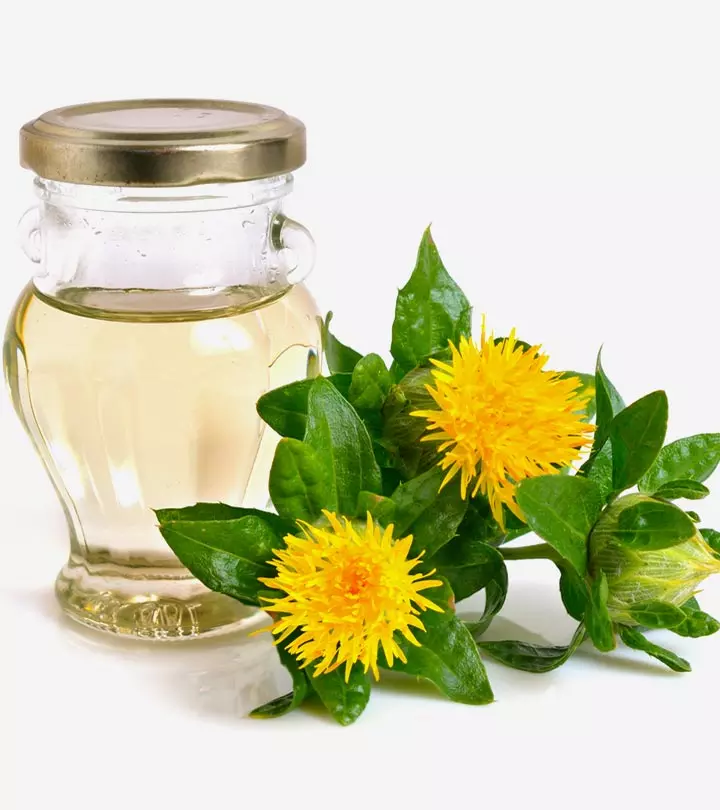




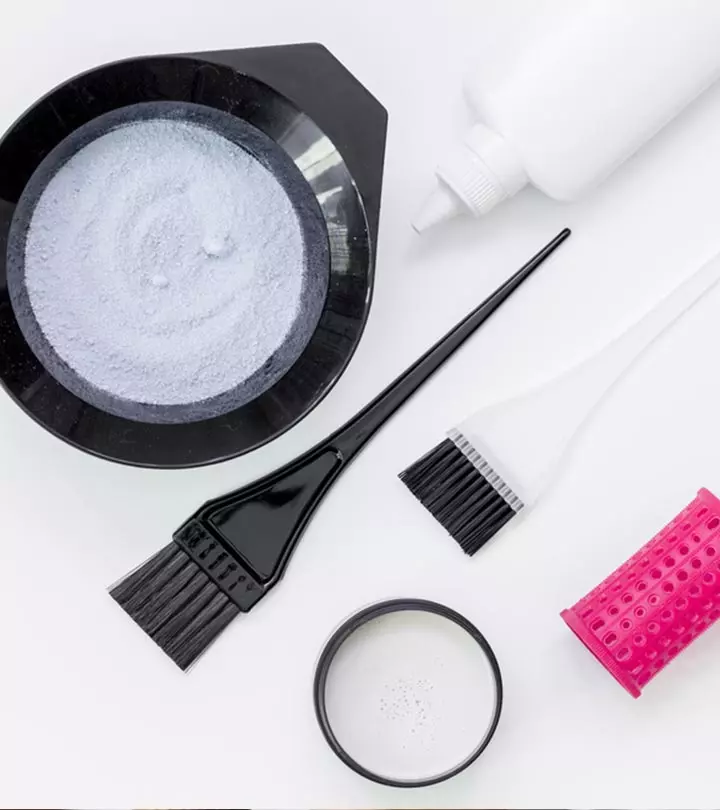


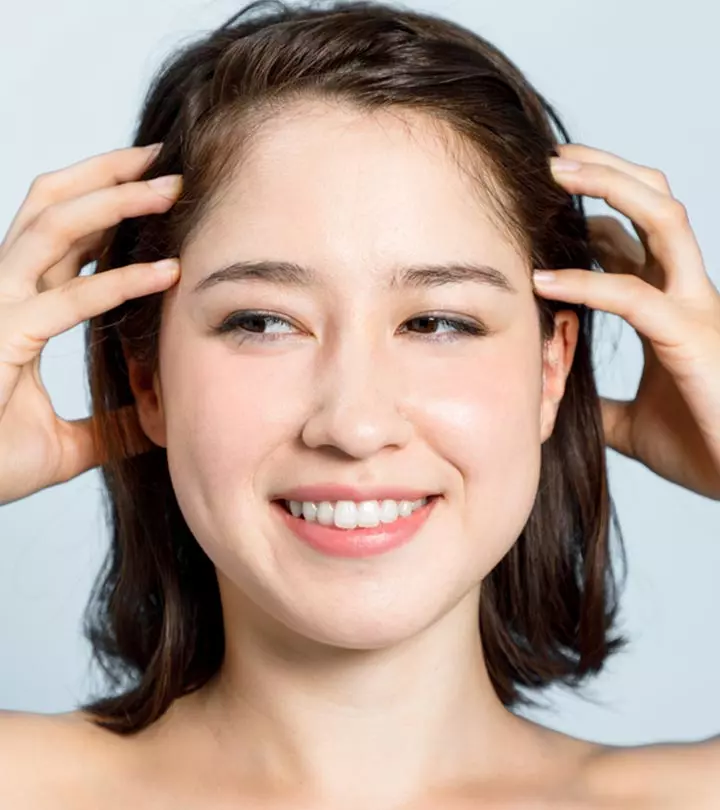
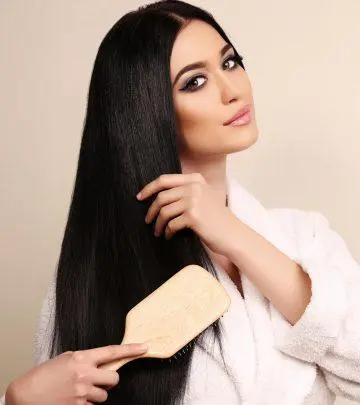

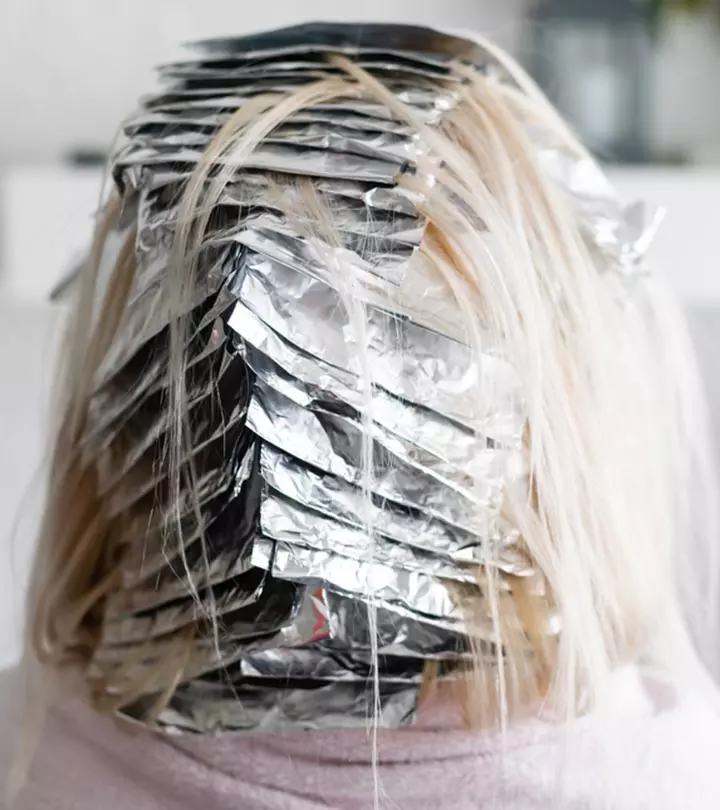

Community Experiences
Join the conversation and become a part of our empowering community! Share your stories, experiences, and insights to connect with other beauty, lifestyle, and health enthusiasts.